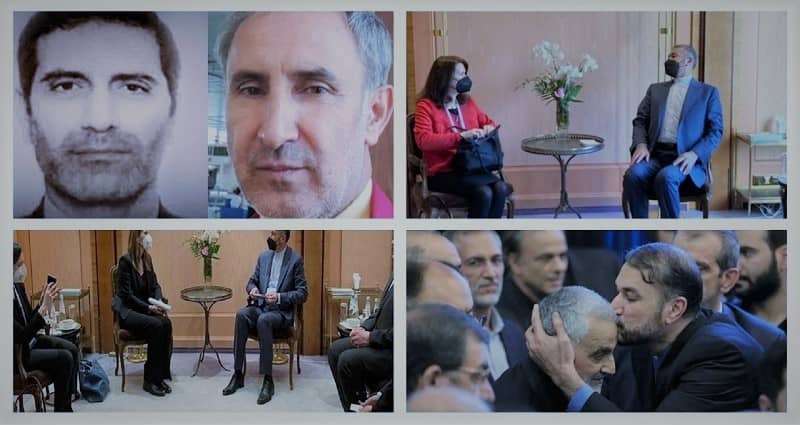
According to a report from the Fars News Agency on February 19, the Iranian regime’s foreign minister, Hossein Amir-Abdollahian attended the Munich Security Conference in Germany and met with foreign ministers from Belgium and Sweden to discuss the statuses of Iranian officials detained in both countries.
Amir-Abdollahian’s meeting with his Belgian counterpart was in regard to the former Iranian diplomat, Assadollah Assadi, who is currently serving a 20-year sentence in prison for orchestrating the bombing of an Iranian Resistance rally in France in 2018, which ultimately failed.
He later met with the Swedish foreign minister the same day to discuss the trial ongoing in Stockholm of former Iranian prison official, Hamid Noury. Noury was arrested in Sweden in 2018 for his involvement in the 1988 massacre of over 30,000 political prisoners in Iran. Noury’s trial is set to run until April of this year and has featured the testimonies of many of his victims, who have recalled the atrocities he committed in Gohardasht Prison in Karaj.
Amir-Abdollahian reportedly said to his Swedish counterpart that, “it’s not acceptable that the relations between the two countries are affected by the conspiracies,” placing the blame of the situations on the Iranian opposition group, the People’s Mojahedin Organization of Iran (PMOI/MEK).
The regime has been trying desperately for years to distance themselves from these ‘controversies’, however the conviction of Assadi last year, along with the extent of the testimonies heard during Noury’s trial have opened the eyes of the international community and the regime can no longer ignore the shockwaves these cases have caused.
The MEK said, “The regime is terrified of the outcome and implications of both trials to the point where its foreign minister is overtly intervening and vouching for the release of the two criminals after other efforts—including terrorist threats and hostage-taking—proved futile.”
The regime’s diplomacy strategies, and apparatus, work in conjunction with their terrorist network, and the operations of the Islamic Revolutionary Guard Corps’ Quds Force (IRGC-QF) and the Ministry of Intelligence and Security (MOIS). Through the regime’s embassies and other diplomatic facilities, as well as the diplomats working in them, the regime run their espionage and terrorist operations.
A previously leaked audio file of the regime’s former foreign minister, Mohammad Javad Zarif, highlighted that many of the regime’s policies are dominated by the IRGC and outlined the strategies they have put forward that caused terrorist crimes across the world.
In the audio file, Zarif was heard admitting that his policies were coordinated with the former commander of the IRGC-QF, Qassem Soleimani, the terrorist mastermind who was assassinated in 2020 during a drone attack in Iraq.
In a reaction to the leaked file, Zarif stressed that unity within the regime is its best hope for survival. He said, “Reducing the theoretical discussion between the two wings of the establishment’s external power, which means diplomacy and the frontline, as an excuse for promoting a divergence between the military and diplomats who both strive for the state, is not only short-sighted but in full contrast to my views that diplomacy and the frontline complement each other.”
Following Ebrahim Raisi’s ascension to the role of the regime’s President last year, the foreign ministry, the IRGC and the MOIS have joined forces and have created tighter relations. Raisi’s cabinet also contains many IRGC veterans, and Amir-Abdollahian was previously a liaison officer with the Quds Force, who had very close ties with Soleimani. With this consolidation of power, the regime is attempting to show that they are not willing to back down from a fight.
Following Assadi’s arrest in 2018, Amir-Abdollahian sent threats to Western powers that the regime would ‘shock’ western states if Assadi was not released. However, his threats fell on deaf ears.
The MEK said, “This is not the first time that the regime has tried to pressure the executive branch of a country to release its criminals. But its desperation on the international stage reflects its waning power at home, where the people and their Resistance movement are determined to unseat the mullahs with their continued protests and uprisings.”